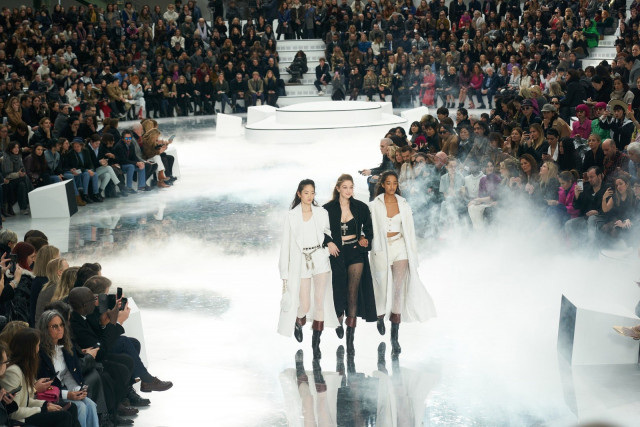Runway revolution: Is this the end of fashion as we know it?
Paris Fashion week goes online as designers call fashion shows 'outmoded'

Paris fashion week goes online for the first time in its history Monday, with fashion rocked not just by the coronavirus but by a growing revolt from within the industry.
The virus has brought designers' long-suppressed frustrations with the system and its unforgiving pace bubbling to the surface. Many are questioning not just the infernal rhythm and environmental impact of five and six collections a year, but whether fashion weeks or even fashion shows still make sense in a digital world.
"I can no longer cope with an industry built on abuse and consumerism, thriving on environmental destruction and perpetuating racial and gender-based injustice," declared the rising Brazilian creator Francisco Terra Wednesday, the brains behind the Neith Nyer brand. Terra - one of a wave of young designers to have broken onto the Paris catwalk in recent years - said that from now on he would only show once a year, "maybe twice".
He is far from alone. Spanish wunderkind Alejandro Palomo said he is not sure if costly Paris shows really work for him while Colombian Esteban Cortazar said he has turned his back on them for now. "I love the shows," Palomo said, "but I am not going to put the pressure on my body of having to do one every few months," he claimed.
Nor is the rebellion confined to smaller independent labels.
Shows 'outmoded'
The tectonic plates began to shift in April when Saint Laurent designer Anthony Vaccarello said he was pulling out of Paris fashion week this year. From now on the label would "take control of its pace and reshape its schedule," he said.
Gucci's Alessandro Michele delivered another bombshell in May, slashing his shows from five to two a year, and questioning the whole idea of seasons, on which the fashion calender is built. "Clothes should have a longer life," he said, and should be "seasonless". Mugler designer Casey Cadwallader said Thursday he would follow the same path.
The cracks really began to show after several hundred industry players led by Belgian master Dries Van Noten signed an open letter in May arguing for a major overhaul of the industry. Brands like Chloe, Thom Browne, Y/Project, Lemaire and Alexandre Mattiussi as well as some top-end department stores have since joined the call for "fundamental change that will simplify businesses, making them more environmentally and socially sustainable."
They want the fashion calendar redrawn so winter clothes hit the shops in winter and summer ones in summer -- rather than months before as they do now. For others, the fashion show itself is as "outmoded" as the calendar.
A broad-based coalition called "Rewiring Fashion", uniting the likes of hot US labels 1017 ALYX 9SM, Rodarte, Proenza Schouler and Phipps with several Paris stalwarts has laid out another top-to-bottom reimaging of the system. "We find ourselves facing a fashion system that is less and less conducive to genuine creativity and ultimately serves the interests of nobody: not designers, not retailers, not customers - and not even our planet," they said.
Time to slow down
They too insist the "fashion calendar is out of sync with the customer, unsustainable for industry professionals and damaging for sales. "It's time to slow down," their manifesto declared.
In a digital world staging fashion shows six months before the clothes hit the shops makes no sense, and was an open invitation to fast-fashion rip off merchants, it added. Like Van Noten, they also want an end to discounting and Black Friday-type sales which they blame for much of the industry's wasteful overproduction.
However, some top luxury brands are not yet ready for revolution.
Dior CEO Pietro Beccari defended both the calendar and shows, by adding that "a live performance is like nothing else. We believe there will always be a place for a live show." But Palomo believes the video presentations forced upon Paris fashion week by the pandemic may be a blessing in disguise, opening the door to freeing up the way designers present their creations.
While Paris fashion week prides itself on giving young guns a place in the schedule alongside iconic houses like Dior, Chanel and Hermes, Palomo and Cortazar say it was also "killing them economically".
"Everyone is trying to keep up their image, to make out that everything is fine, and behind the scenes we are spending money that we do not have," Cortazar said.
Have something to add to the story? Share it in the comments below.



















COMMENTS
Comments are moderated and generally will be posted if they are on-topic and not abusive.
For more information, please see our Comments FAQ